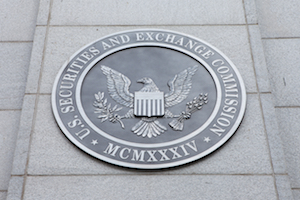In what appears to take direct aim at cryptocurrency, newly proposed amendments by the Securities and Exchange Commission would expand the current custody rule to include any client assets of which an adviser has custody.
 The Commission voted 4-1, with Republican Commissioner Mark Uyeda voting in support of releasing the proposal, despite having concerns with several provisions. If adopted, the changes would amend and redesignate rule 206(4)-2, the Commission’s custody rule, under the Investment Advisers Act of 1940 and amend certain related recordkeeping and reporting obligations.
The Commission voted 4-1, with Republican Commissioner Mark Uyeda voting in support of releasing the proposal, despite having concerns with several provisions. If adopted, the changes would amend and redesignate rule 206(4)-2, the Commission’s custody rule, under the Investment Advisers Act of 1940 and amend certain related recordkeeping and reporting obligations.
The SEC explains in a fact sheet that, since the current custody rule was last amended in 2009, changes in technology, advisory services and custodial practices have created “new and different ways for client assets to be placed at risk of loss.” Pointing to authority under section 411 of the Dodd-Frank Act, the Commission’s proposed rules would broaden the application of the current rule beyond client funds and securities to include “any client assets in an investment adviser’s possession or when an investment adviser has authority to obtain possession of client assets.” Like the current rule, the proposed rule would delegate safekeeping of client assets to qualified custodians, including, for example, certain banks or broker-dealers.
In a statement, SEC Chair Gary Gensler explains that the proposal would help ensure client assets are properly segregated and held in accounts to protect the assets in the event of a qualified custodian bankruptcy or other insolvency, particularly with respect to cryptocurrency.
“Make no mistake: Today’s rule, the 2009 rule, covers a significant amount of crypto assets. As the release states, ‘most crypto assets are likely to be funds or crypto asset securities covered by the current rule.’ Further, though some crypto trading and lending platforms may claim to custody investors’ crypto, that does not mean they are qualified custodians. Rather than properly segregating investors’ crypto, these platforms have commingled those assets with their own crypto or other investors’ crypto. When these platforms go bankrupt—something we’ve seen time and again recently—investors’ assets often have become property of the failed company, leaving investors in line at the bankruptcy court,” the SEC chair explained.
For her part, Republican Commissioner Hester Peirce, who voted against releasing the proposal, said that she anticipated supporting an updated custody rule, but that she has numerous concerns with the current proposal. Among them are concerns related to crypto. Specifically, Peirce explains that the release states that some advisers “might take the position that crypto assets are not covered by the custody rule at all. This, however, is incorrect because most crypto assets are likely to be funds or crypto asset securities covered by the current rule.”
Peirce suggests that such sweeping statements in a rule proposal seem designed for immediate effect, which, she notes, shouldn’t be the case in a proposal. “These statements encourage investment advisers to back away immediately from advising their clients with respect to crypto. More generally, the sweeping ‘just about every crypto asset is a security’ statements also seem to be part of a broader strategy of wishing complete jurisdiction over crypto into existence,” the Republican Commissioner argued.
The Proposal
The proposed rule would define “assets” as “funds, securities, or other positions held in a client’s account.” However, the proposed rule also would apply to other positions held in a client’s account that are not funds or securities. Consequently, the proposed rule’s definition of assets would include investments such as all crypto assets, even in the instances where such assets are neither funds nor securities. Assets under the rule also would include financial contracts held for investment purposes, collateral posted in connection with a swap contract on behalf of the client, and other assets that may not be clearly funds or securities covered by the current rule.
“We believe, in the advisory account context, that the entirety of a client account’s positions, holdings, or investments should receive the protections of the proposed rule regardless of how they may be treated for accounting purposes,” the SEC explains. “Moreover, the fiduciary duty extends to the entire relationship between the adviser and client regardless of whether a specific holding in a client account meets the definition of funds or a security.”
The proposed rule would also “enhance protections” for certain securities and physical assets that cannot be maintained by a qualified custodian. Additionally, the proposal retains the current requirement for an adviser with custody of client assets to obtain a surprise examination from an independent public accountant to verify client assets, but it would modify the audit provision to expand the availability of its use, enhance investor protection and facilitate compliance.
Finally, the proposal would amend the investment adviser recordkeeping rule to require advisers to keep more detailed records of trade and transaction activity and position information for each client account of which it has custody. It also would amend Form ADV to align advisers’ reporting obligations with the proposed safeguarding rule’s requirements.
A public comment period will remain open for 60 days following publication of the proposal in the Federal Register.

